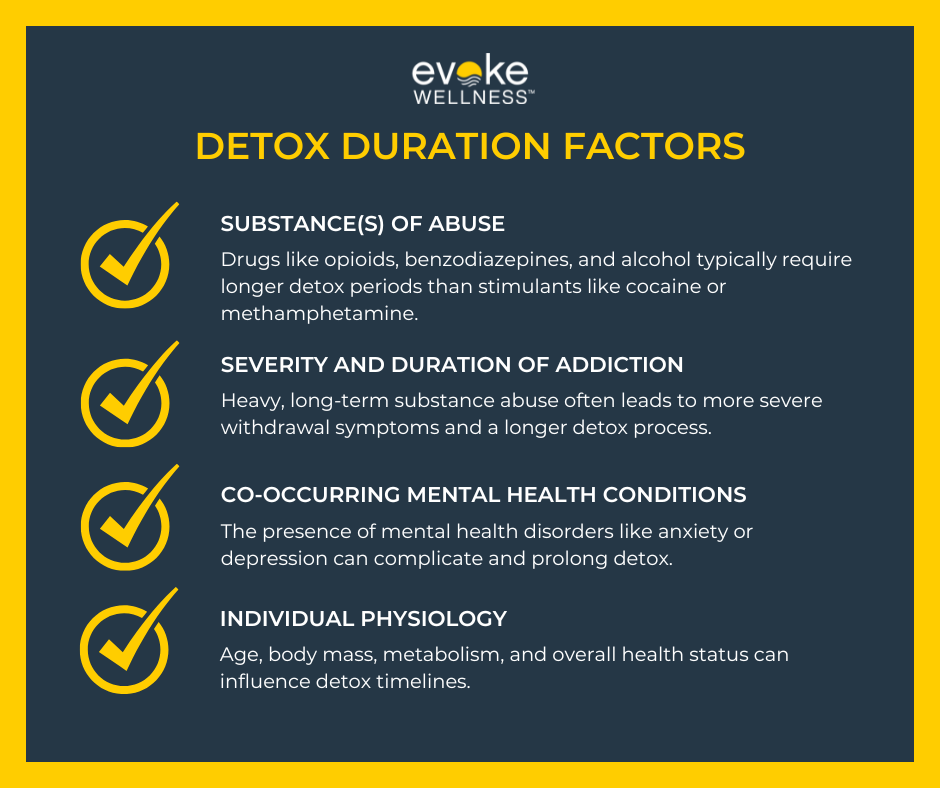When you’re ready to break free from substance addiction, detoxification is a crucial first step. But how long does this process actually take? The answer isn’t straightforward, as detox duration can vary significantly from person to person. Recent studies show that while some individuals may complete detox in as little as 3-5 days, others may require up to two weeks or more. Understanding the factors that influence detox length is essential for setting realistic expectations and preparing for your recovery journey. In this article, we’ll explore the key elements that affect detox duration and provide insights to help you navigate this challenging but transformative process.
Together, let’s embrace the journey to recovery and the promise of a new beginning. Call us at (833) 503-0734 today or reach out online.
What Is Drug and Alcohol Detox?
The Detox Process
Drug and alcohol detox is the first crucial step in overcoming substance addiction. It involves allowing the body to rid itself of drugs or alcohol while managing withdrawal symptoms. During this process, harmful toxins are flushed from the system, preparing the individual for further addiction treatment.
Supervised Medical Support
Attempting detox alone can be extremely dangerous and even life-threatening. According to Stanford’s Human-Centered AI group, over 2 million Americans suffer from opioid use disorder annually. Safe, medically supervised detox is vital to help manage intense cravings, minimize risks, and increase the chances of a successful recovery.
Comprehensive Care
At Evoke Wellness, our detox program provides 24/7 medical monitoring and support. Medications may be used to alleviate withdrawal symptoms, ensuring a comfortable and secure experience. Counseling and therapy sessions help address the psychological aspects of addiction during this transition phase.
Personalized Treatment Plans
The duration of detox varies based on several factors, including the substance(s) used, the length and severity of addiction, and the individual’s overall health. Our team creates personalized treatment plans tailored to each client’s unique needs for a safe, effective detox process.
Factors That Impact Detox Timeline
Substance Type & Severity
- Detox duration varies greatly based on the substance(s) used and severity of addiction
- Alcohol, heroin, and prescription opioids tend to have shorter but more intense detox timelines
- Stimulants like methamphetamine and cocaine can require longer detox periods
Poly-Substance Use
- Using multiple substances compounds the withdrawal process
- The brain and body must readjust to the absence of each substance concurrently
- Poly-substance abuse often indicates a more severe addiction, further extending detox
Co-Occurring Disorders
- 37% of alcohol abusers and 53% of drug abusers also have a serious mental illness
- Addressing co-occurring mental health issues during detox is crucial but can prolong the process
- Proper dual diagnosis treatment integrates addiction and mental health care
Individual Factors
- Genetics play a role in physical dependence and withdrawal intensity
- Age, metabolism, overall health status, and environmental stressors impact detox duration
- Those with supportive home settings may have shorter, more manageable detox timelines
No matter the variables, effective detox treatment is comprehensive, clinically supervised, and tailored to each individual’s needs. While challenging, this first step paves the way for sustained recovery.
The Length Of Detox By Substance
The duration of the detox process largely depends on the specific substance involved. Some substances leave the body faster than others, resulting in a relatively shorter detox timeline.
Alcohol Detox
- Acute withdrawal symptoms typically peak within 24-72 hours
- Psychological cravings and sleep disturbances can last for weeks
- Full recovery may take 6-12 months for long-term heavy drinkers
Opioid Detox
- Withdrawal onset within 8-24 hours of last use
- Acute phase peaks around 72 hours
- Residual symptoms can linger for weeks or months
Stimulant Detox
- Cocaine withdrawal begins within hours, peaks at 1-3 days
- Meth withdrawal starts in 24 hours, peaks in 7-10 days
- “Crash” and depleted energy can last 1-2 weeks
Benzodiazepine Detox
- Onset within 1-4 days after last dose
- Acute phase can last 2-4 weeks
- Protracted withdrawal may continue for months or years
The substances’ half-life, degree of physiological dependence, and individual factors like genetics and metabolism influence the detox timeline. Medically-supervised detox helps manage uncomfortable and potentially dangerous withdrawal symptoms.
Detox Withdrawal Timelines for Common Substances
Opioid Withdrawal
Opioid withdrawal symptoms typically begin within 12 hours after the last dose, with acute symptoms peaking around 72 hours. Early symptoms like muscle aches, sweating, and anxiety give way to more severe effects like vomiting, diarrhea, and intense drug cravings. Without medical support, opioid withdrawal can be extremely uncomfortable and distressing.
Stimulant Withdrawal
For stimulants like cocaine, methamphetamine, and prescription drugs like Adderall, withdrawal effects tend to emerge within 1-3 days after discontinuing use. Fatigue, depression, disturbed sleep patterns, and intense cravings are common. Adderall withdrawal in particular can cause severe psychological symptoms like anxiety and suicidal thoughts that typically peak within 1-4 weeks.
Benzodiazepine Withdrawal
Benzodiazepines like Xanax and Klonopin have a high addiction potential due to their potent sedative effects. Withdrawal symptoms can manifest within hours to days of discontinuation and may include tremors, insomnia, anxiety, seizures, and even psychosis in severe cases. Medical supervision is crucial to taper dosages gradually and manage potentially life-threatening complications.
How Long Does Medical Detox Take?
Detox Duration Factors
The duration of medical detox can vary significantly from person to person, as it depends on several key factors:
Typical Detox Timeframes
While there is no one-size-fits-all timeline, medical detox generally follows these broad timeframes:
- Alcohol: 5-10 days, with acute withdrawal peaking around 24-72 hours.
- Opioids: 5-10 days, with the most intense symptoms occurring within the first 72 hours.
- Benzodiazepines: 5-28 days, depending on the specific benzodiazepine and duration of use. Longer detox periods may be required for high-dose, long-term users.
- Stimulants: 3-7 days, though psychological cravings and mood disturbances can persist.
Importance of Professional Detox
No matter the expected duration, attempting detox without medical supervision can be extremely dangerous and even life-threatening. A professional detox program provides around-the-clock monitoring, medications to manage withdrawal symptoms, and a safe, supportive environment for the individual’s physical and psychological needs.
While the detox process can be challenging, it is a crucial first step towards lasting recovery. With the right care and support, individuals can overcome their physical dependence and begin the journey of healing.
FAQ: How Long Does Detox Take?
Factors Influencing Duration
- Substance(s) used and length of usage
- Co-occurring mental health conditions
- Physical health and metabolism rate
- Chosen detox setting (inpatient vs outpatient)
- Use of medication-assisted treatment
Average Timelines
The full detox process generally takes 5-10 days for most substances. However, timelines can vary significantly:
- Alcohol: 3-10 days
- Opioids: 5-10 days
- Benzodiazepines: 10-20 days
- Stimulants: 2-10 days
Certain substances like marijuana may only require 1-2 weeks, while others like methadone could take several weeks.
Post-Acute Withdrawal
Even after initial detox, post-acute withdrawal symptoms like cravings, mood swings, and sleep issues can persist for weeks or months. This highlights the importance of comprehensive addiction treatment plans beyond just the detox phase.
Personalized Timelines
Ultimately, detox duration is highly individual. An assessment by medical professionals considers one’s unique physiology and history to develop a personalized, safe detox plan. With proper care, this first step paves the way for sustained sobriety.
Conclusion
In conclusion, the duration of detox varies widely based on individual factors. While some may complete the process in a few days, others require weeks or months for a full recovery. Remember, detox is only the first step in addiction treatment. To achieve lasting sobriety, you’ll need ongoing therapy and support. By understanding the factors that influence detox duration, you can better prepare for the journey ahead. Seek professional help to ensure a safe, effective detox tailored to your unique needs. Your path to recovery starts here. Let’s embrace the journey to recovery and the promise of a new beginning. Call us at (833) 503-0734 today or reach out online.



